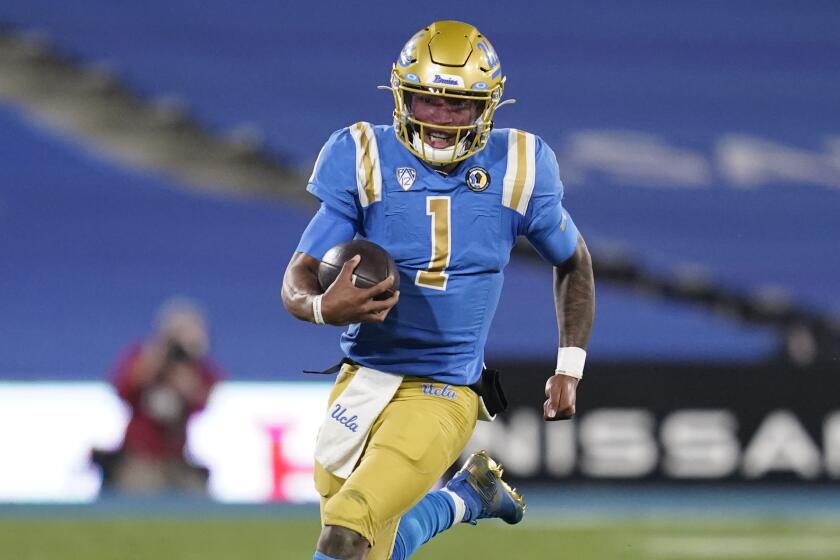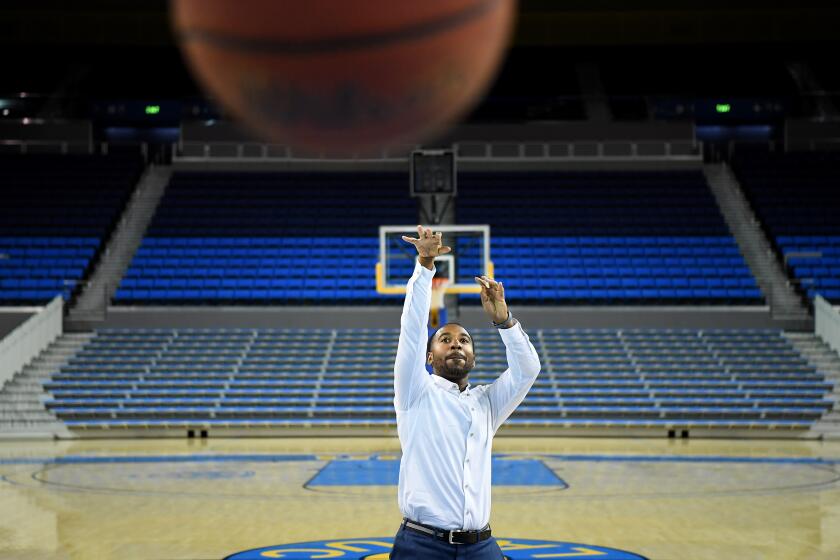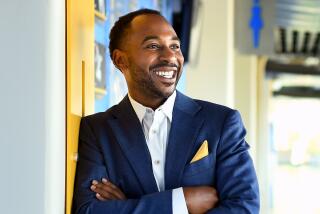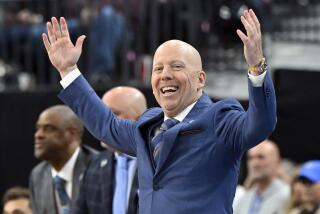Recent trouble can’t diminish Martin Jarmond’s rosy outlook for UCLA sports
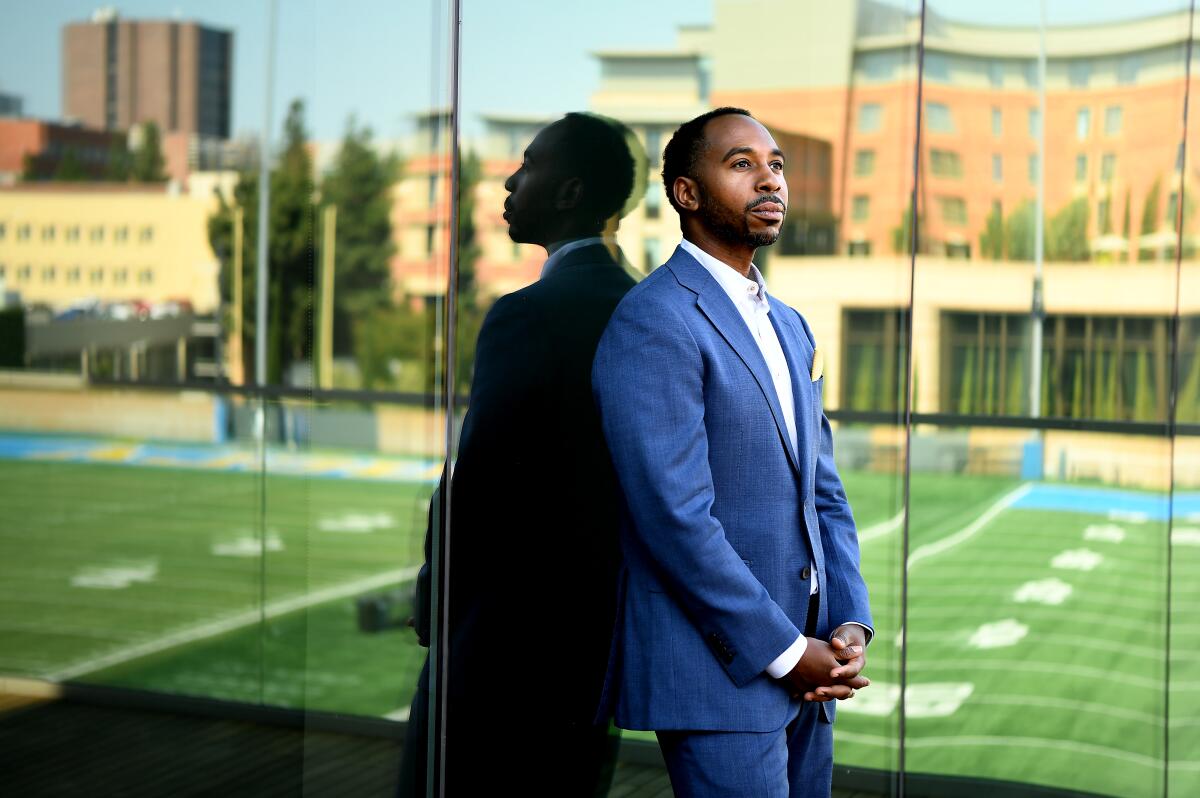
Navigating UCLA’s athletic department through the early stages of a pandemic at a time when its apparel sponsor had backed out of a history-making deal might feel like the good old days for Martin Jarmond.
More recently, the athletic director who is approaching his second anniversary on the job has been confronted by one squeamish situation after another.
The football team was castigated for backing out of the Holiday Bowl only hours before kickoff. The gymnastics team has been scarred by mistrust over coaches’ and athletic officials’ handling of alleged racial slurs made by a teammate. An already crippling athletic department deficit topped $100 million.
Along the way, Jarmond absorbed criticism for not being more open in his communication about the problems. Jarmond acknowledged some regrets in a wide-ranging interview with The Los Angeles Times while also touting successes such as the football team’s resurgence that lured ESPN’s “College GameDay” to campus last fall and having four teams currently ranked in the top five nationally.
When it comes to the future of UCLA athletics, Jarmond is a Bruin who remains bullish.
“Progress isn’t linear,” Jarmond said. “In order to have highs, lows come with the territory. But the key is how you handle it all. You focus on the things you can control, maintain a growth mindset and do your best. The challenges that we’ve faced recently have prompted us to evaluate processes and have critical conversations. This is healthy. The things we’re learning from them are going to make us better.”
Lesson No. 1 might be that working quietly behind the scenes to resolve conflict that has spilled into the public domain can be excruciating.
The Bruins’ record $62.5-million deficit for the 2021 fiscal year reflects the many ways in which COVID-19 has affected schools from coast to coast.
The gymnastics brouhaha involved a member of the team purportedly using the N-word on multiple occasions, leading to strife between competitors and coaches with differing views on how to respond. Rumors surfaced that some gymnasts bullied the offending teammate, who eventually transferred. Jarmond became ensnared in the ordeal when two gymnasts tweeted about their athletic director as part of a plea for help.
Senior Norah Flatley wrote that she had not seen or heard from Jarmond in more than three months after the team “exhausted every avenue to have this issue addressed.” Senior Margzetta Frazier echoed those concerns, writing that the team did not speak with Jarmond until after the incident became public.
Jarmond said he has met with the gymnasts multiple times and tried to be as responsive as possible while also engaging experts in mental health and other fields as part of a coordinated effort to support the team.
“Let me say that everything shared on social media or reported in traditional media is not always accurate, and that holds true not just in this topic but throughout society in general,” Jarmond said. “There are different perspectives and contexts that are often missing.
“Having said that, any assertion that I don’t take racism and bias serious is misguided. I’m a Black man that grew up in the South. I understand pain, anger and trauma that can come from ignorance or flat-out discrimination. These are complex issues and as I previously said, we can do better, especially when it comes to support, tools and training for our students, coaches and staff.”
Jarmond, 42, said his evaluation of the situation is ongoing, acknowledging that the team remains deeply affected by the fallout.
There was no playbook for what unfolded on the morning of the Holiday Bowl. After remaining hopeful that the football team would have enough players available to face North Carolina State, the Bruins were blindsided by an outbreak of positive tests for the coronavirus only hours before the game.
“I’m a Black man that grew up in the South. I understand pain, anger and trauma that can come from ignorance or flat-out discrimination.”
— UCLA athletic director Martin Jarmond
Depth along the defensive line was already thin because of departures, injuries and previous positive tests. Playing the game would have forced several players to switch positions, UCLA officials believed, putting them at increased risk of injury. UCLA withdrew from the bowl, infuriating the Wolfpack over a perceived lack of communication about the possibility of being unable to compete so that an alternate opponent could be put on standby.
But that wasn’t common practice. Across the country, bowl teams weren’t routinely disclosing how dire their respective situations related to the virus had become unless they were forced to withdraw from games. UCLA had tested its unvaccinated players before departing for the bowl in San Diego, suggesting that those who tested positive on the day of the game developed symptoms.
It had been impossible to predict how many players might be sidelined and at what positions.
“Health and safety of our student-athletes is always the priority,” Jarmond said. “What is unfortunate is the timing that the cancellation occurred so close to kickoff. I deeply regret that so many fans had traveled for the game and students from both teams that worked so hard for this moment. But again, we cannot waver from our responsibility to ensure the health and safety of our student-athletes.”
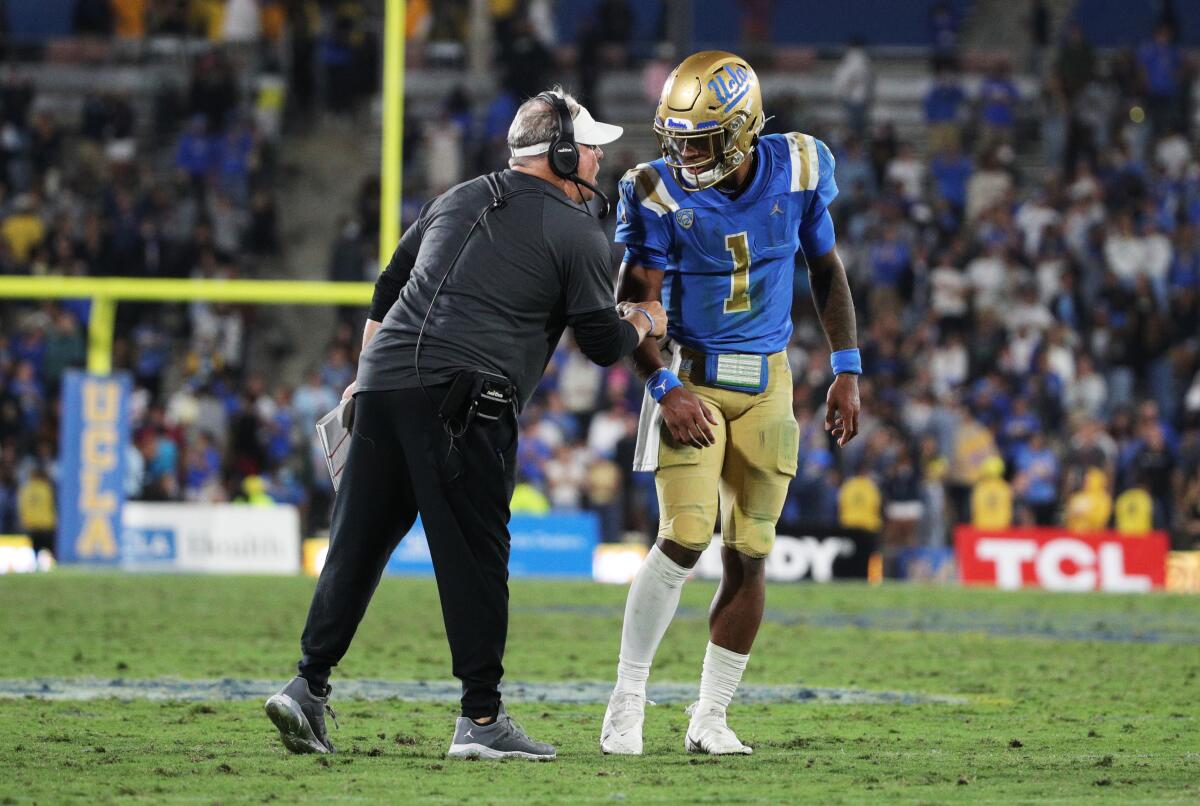
Jarmond’s tone brightened considerably when discussing the football team’s prospects for 2022 after finishing last season 8-4, its most significant step forward under Chip Kelly. The coach was rewarded last month with a new four-year contract, though the terms of the deal have not been made public.
Kelly completed his staff last week with the hiring of defensive coordinator Bill McGovern, the fourth new assistant to arrive since the end of last season. Veteran quarterback Dorian Thompson-Robinson and running back Zach Charbonnet are expected to headline an offense that could be the most prolific in the Pac-12.
“I’m excited about this football program,” Jarmond said. “We closed strong last season, winning eight games, and I’m excited about the new coaches that have joined the football staff and the energy around the program.”
Winning big could help solve what might constitute Jarmond’s greatest dilemma: the budget.
“The challenges that we’ve faced recently have prompted us to evaluate processes and have critical conversations. This is healthy. The things we’re learning from them are going to make us better.”
— UCLA athletic director Martin Jarmond
More buzz equals more fans equals more dollars for an athletic department that desperately needs it all after posting a record $62.5-million deficit for the 2021 fiscal year. That tab pushed the department’s three-year deficit to a whopping $102.8 million, leaving Jarmond to clean up a financial mess he largely inherited.
There’s hope for salvation beyond possible increases in ticket sales, donations and sponsorships that are mostly contingent on success in football and men’s basketball. The Pac-12’s media rights deal expires in 2024, meaning an infusion of many millions of dollars per year could be on the way based on the massive revenue streams already flowing into other major conference schools that have recently renegotiated their contracts.
UCLA could recoup its losses with a single court decision if its lawsuit seeking more than $200 million in damages from Under Armour after the apparel giant terminated its record deal with the school is resolved in the Bruins’ favor.
Self-help might be the easiest solution. A university that provides a trifling amount of financial support compared with its conference counterparts could significantly enhance its commitment. California Chancellor Carol Christ recently did just that, giving her athletic department $20.1 million to help cover the Golden Bears’ pandemic debt, a challenge that Jarmond is painfully familiar with when he examines his department’s finances.
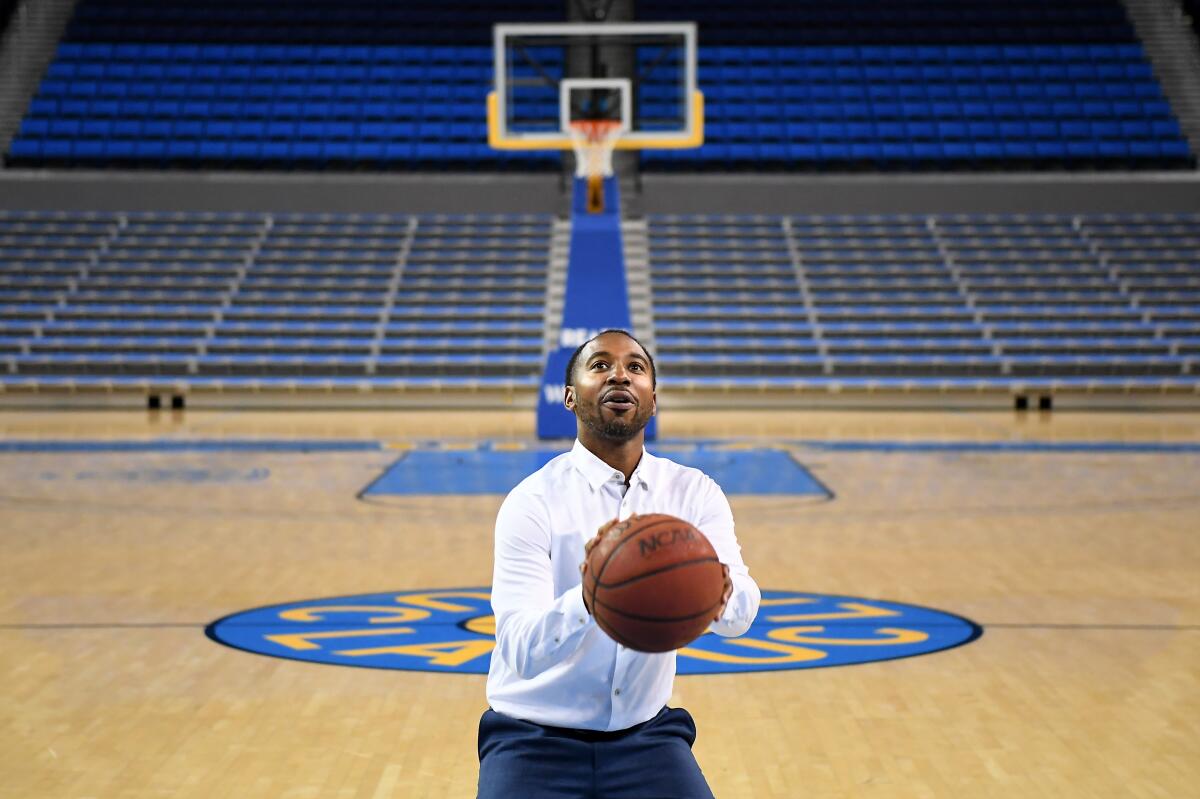
“We are similar to most athletic departments in the country in that we have a financial challenge exacerbated by the pandemic,” Jarmond said. “We are partnering with campus to find solutions that will put us in a much better financial situation over time. We appreciate their continued support. This will take us a few years to solve, but I am confident that the budget situation will be fixed.”
One remedy would involve the revision of an arrangement that forces the athletic department to pay a usage fee for Pauley Pavilion while also covering the lingering costs of renovations on an arena it doesn’t own. During the 2021 fiscal year, the athletic department was on the hook for $9.04 million to service debt on the expansion and renovation of Pauley Pavilion and the Morgan Center as well as the recently completed Mo Ostin Center and Wasserman Football Center. The university could ease this burden by redirecting future debt payments to other departmental ledgers.
The athletic department is exploring a more mutually beneficial arrangement with the Rose Bowl, which not only keeps revenue from suites and premium seats but has not disclosed the names of suite holders to UCLA so that it can court them as donors.
UCLA athletic director Martin Jarmond closes a high-stress year and pushes forward to help the Bruins rebound from COVID-19 pandemic financial losses.
Among his triumphs, Jarmond oversaw the return of alcohol sales at the Rose Bowl and said there would soon be new initiatives to announce, including a program to bolster name, image and likeness deals for Bruins athletes.
The recent challenges have not tempered Jarmond’s enthusiasm for his vision of what his department can become.
“I’ve been here 17 months and I’m learning something every week that makes this a special place,” Jarmond said. “The people here and Bruins around the country are phenomenal and so incredibly passionate about UCLA athletics and what we stand for. That motivates me to do all we can to make Bruin Nation proud.”
There’s no need for Jarmond to look back, even wistfully, with so much opportunity for better days ahead.
More to Read
Go beyond the scoreboard
Get the latest on L.A.'s teams in the daily Sports Report newsletter.
You may occasionally receive promotional content from the Los Angeles Times.

